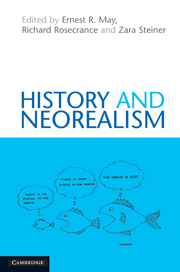Book contents
- Frontmatter
- Contents
- List of tables
- Notes on contributors
- Acknowledgments
- 1 Theory and international history
- 2 Transformations in power
- 3 Domestically driven deviations: internal regimes, leaders, and realism's power line
- 4 How international institutions affect outcomes
- 5 Not even for the seventeenth and eighteenth centuries: power and order in the early modern era
- 6 Austria-Hungary and the coming of the First World War
- 7 British decisions for peace and war 1938–1939: the rise and fall of realism
- 8 Realism and risk in 1938: German foreign policy and the Munich Crisis
- 9 Domestic politics, interservice impasse, and Japan's decisions for war
- 10 Military audacity: Mao Zedong, Liu Shaoqi, and China's adventure in Korea
- 11 The United States' underuse of military power
- 12 The overuse of American power
- 13 Redrawing the Soviet power line: Gorbachev and the end of the Cold War
- 14 Shared sovereignty in the European Union: Germany's economic governance
- 15 John Mearsheimer's “elementary geometry of power”: Euclidean moment or an intellectual blind alley?
- 16 History and neorealism reconsidered
- Index
- References
8 - Realism and risk in 1938: German foreign policy and the Munich Crisis
Published online by Cambridge University Press: 05 June 2012
- Frontmatter
- Contents
- List of tables
- Notes on contributors
- Acknowledgments
- 1 Theory and international history
- 2 Transformations in power
- 3 Domestically driven deviations: internal regimes, leaders, and realism's power line
- 4 How international institutions affect outcomes
- 5 Not even for the seventeenth and eighteenth centuries: power and order in the early modern era
- 6 Austria-Hungary and the coming of the First World War
- 7 British decisions for peace and war 1938–1939: the rise and fall of realism
- 8 Realism and risk in 1938: German foreign policy and the Munich Crisis
- 9 Domestic politics, interservice impasse, and Japan's decisions for war
- 10 Military audacity: Mao Zedong, Liu Shaoqi, and China's adventure in Korea
- 11 The United States' underuse of military power
- 12 The overuse of American power
- 13 Redrawing the Soviet power line: Gorbachev and the end of the Cold War
- 14 Shared sovereignty in the European Union: Germany's economic governance
- 15 John Mearsheimer's “elementary geometry of power”: Euclidean moment or an intellectual blind alley?
- 16 History and neorealism reconsidered
- Index
- References
Summary
It is no coincidence that realism in its classical form was a child of the Second World War. In Hans Morgenthau's formulation, realist theory assumes that states act as individuals (“Germany attacked Poland”), that they have clear interests, and that they expand their power when and where they can in ways that have their roots in “human nature.” International relations, in short, are conducted between rational actors with (as an economist would say) relatively simple utility functions. According to Kenneth Waltz, states seek to ensure their own survival in a more or less anarchic world, either by increasing their own internal strength or by “external balancing,” in other words, forging alliances with other states. Cooperation between states can never be universal because a combination of states is only meaningful when it is directed against another state or a combination of states. At all times, the national security of the individual state must be paramount. A more radical theory (“offensive realism”) is that great powers always aim at more than mere survival; they seek hegemony, making conflicts between great powers inevitable. Peace can be based only on a balance of power in which each would-be hegemon's acquisitive impulses are checked by other states' individual or combined capacities for retaliation.
The uniting theme of this volume is that foreign policy is more commonly the product of competing individuals and interest groups acting within a complex institutional framework and, as a result, strategy is not always commensurate with available means and room for maneuver.
- Type
- Chapter
- Information
- History and Neorealism , pp. 155 - 184Publisher: Cambridge University PressPrint publication year: 2010



